2024 FoVea Travel and Networking Award Recipients
FoVea is pleased to announce the winners of our 2024 FoVea Travel and Networking Award.
The FoVea Travel and Networking Award was open to members of the Vision Science Society (VSS) who identify as women and are in pre-doctoral, post-doctoral, pre-tenure faculty, or research scientist positions. The award covers costs involved with attending the VSS meeting, including membership fees, conference registration fees, and travel expenses.
FoVea created this award as part of its mission to advance the visibility, impact, and success of women in vision science. A recent report from Cooper and Radonjić (2016) indicated that in 2015, the ratio of women to men in VSS was near equal at the pre-doctoral level (1:1.13), but decreased as career stage increased. The decline is symptomatic of forces that impede the professional development of female vision scientists. A key aspect of professional development is building a professional network to support scientific pursuits and to provide mentorship at critical junctions in one’s academic career. The FoVea Travel and Networking Award will help women vision scientists build their professional network by encouraging them to meet with at least two Networking Contacts at the VSS meeting to discuss their research and consider potential for collaboration.
8 awards were funded by an NSF grant and 1 award was funded by the Visual Cognition journal.
Lénia Amaral
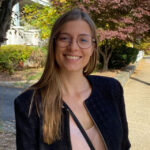 Lénia Amaral is a cognitive neuroscientist currently working as a postdoctoral researcher with Ella Striem-Amit at Georgetown University in Washington DC, USA. Her PhD research was conducted at the University of Coimbra, Portugal, under the supervision of Jorge Almeida and Fredrik Bergström, with a focus on the neural organization of conceptual knowledge and how network activity influences that organization. Her interest extends to how neuroplasticity, influenced by conditions such as deafness or blindness, shapes cognitive systems. Her current postdoctoral work is particularly centered on understanding how individuals differ in their brain’s reorganization following congenital blindness or deafness, aiming to shed light on brain development mechanisms and potentially inform strategies for sensory restoration. More information about her research can be found on her website: https://leniaamaral.github.io/.
Lénia Amaral is a cognitive neuroscientist currently working as a postdoctoral researcher with Ella Striem-Amit at Georgetown University in Washington DC, USA. Her PhD research was conducted at the University of Coimbra, Portugal, under the supervision of Jorge Almeida and Fredrik Bergström, with a focus on the neural organization of conceptual knowledge and how network activity influences that organization. Her interest extends to how neuroplasticity, influenced by conditions such as deafness or blindness, shapes cognitive systems. Her current postdoctoral work is particularly centered on understanding how individuals differ in their brain’s reorganization following congenital blindness or deafness, aiming to shed light on brain development mechanisms and potentially inform strategies for sensory restoration. More information about her research can be found on her website: https://leniaamaral.github.io/.
Akosua Asare
 I am Akosua Asare, a PhD Candidate in the Neuroscience Program at the University of British Columbia, where I work with Dr. Deborah Giaschi and co-supervised by Dr. Hee Yeon Im. I received my Doctor of Optometry degree from the Kwame Nkrumah University of Science and Technology. My research interests are in visual processing in typical and atypical development. In my current research work, I use psychophysics, eye tracking and functional MRI techniques to understand the neural mechanisms underlying motion perception deficits in amblyopia.
I am Akosua Asare, a PhD Candidate in the Neuroscience Program at the University of British Columbia, where I work with Dr. Deborah Giaschi and co-supervised by Dr. Hee Yeon Im. I received my Doctor of Optometry degree from the Kwame Nkrumah University of Science and Technology. My research interests are in visual processing in typical and atypical development. In my current research work, I use psychophysics, eye tracking and functional MRI techniques to understand the neural mechanisms underlying motion perception deficits in amblyopia.
Seah Chang
 Seah Chang is a Postdoctoral Research Associate in the Department of Psychology at the Ohio State University, working with Drs. Julie Golomb and Andrew Leber. She received her PhD in Psychological and Brain Sciences in 2021 from Johns Hopkins University, working with Dr. Howard Egeth. Seah’s research focuses on the role of suppression in attentional and perceptual processes. During her PhD, Seah studied the multifaceted nature of attention, revealing that both enhancement and suppression mechanisms contribute to attentional guidance. Seah is currently investigating how suppression is represented across eye movements, how suppression operates in 3D space, and how broadly enhancement and suppression mechanisms are tuned.
Seah Chang is a Postdoctoral Research Associate in the Department of Psychology at the Ohio State University, working with Drs. Julie Golomb and Andrew Leber. She received her PhD in Psychological and Brain Sciences in 2021 from Johns Hopkins University, working with Dr. Howard Egeth. Seah’s research focuses on the role of suppression in attentional and perceptual processes. During her PhD, Seah studied the multifaceted nature of attention, revealing that both enhancement and suppression mechanisms contribute to attentional guidance. Seah is currently investigating how suppression is represented across eye movements, how suppression operates in 3D space, and how broadly enhancement and suppression mechanisms are tuned.
Mina Elhamiasl
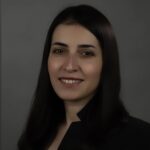 I am a fifth-year PhD student in Behavioral and Cognitive Neuroscience in the Psychology department at the University of Florida, working with Dr. Lisa Scott. My primary research focuses on the underlying neural mechanisms of human visual attention and perception. My dissertation centers on understanding the developmental trajectories of EEG alpha frequency components, including peak frequency and desynchronization, in response to visual attention and their interplay with brain connectivity throughout infancy. before joining UF, I earned my master’s degree in neuroscience from Bilkent University, where I studied the role of attentional bias and emotion dysregulation in the psychopathology of emotional disorders.
I am a fifth-year PhD student in Behavioral and Cognitive Neuroscience in the Psychology department at the University of Florida, working with Dr. Lisa Scott. My primary research focuses on the underlying neural mechanisms of human visual attention and perception. My dissertation centers on understanding the developmental trajectories of EEG alpha frequency components, including peak frequency and desynchronization, in response to visual attention and their interplay with brain connectivity throughout infancy. before joining UF, I earned my master’s degree in neuroscience from Bilkent University, where I studied the role of attentional bias and emotion dysregulation in the psychopathology of emotional disorders.
Kathy Garcia
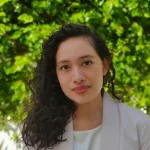 Kathy Garcia is a 2nd year Ph.D. student in Computational Cognitive Science at Johns Hopkins University, advised by Dr. Leyla Isik. She is interested in human vision, deep neural networks (DNNs), and dynamic social perception. Her work aims to find biologically plausible computational models for dynamic and social visual perception. Hence, most of her work thus far has been on large-scale benchmarking of DNNs for dynamic social perception, focusing on the recently proposed “lateral” visual stream. Based on her current work on computational models for dynamic social vision, she was awarded the National Science Foundation’s (NSF) Graduate Research Fellowship in 2024. Prior to her PhD, she was a post-baccalaureate research fellow at Northwestern University, using machine learning models for predicting dimensional symptoms of psychopathology from task-based fMRI using support vector regression with Dr. Robin Nusslock.
Kathy Garcia is a 2nd year Ph.D. student in Computational Cognitive Science at Johns Hopkins University, advised by Dr. Leyla Isik. She is interested in human vision, deep neural networks (DNNs), and dynamic social perception. Her work aims to find biologically plausible computational models for dynamic and social visual perception. Hence, most of her work thus far has been on large-scale benchmarking of DNNs for dynamic social perception, focusing on the recently proposed “lateral” visual stream. Based on her current work on computational models for dynamic social vision, she was awarded the National Science Foundation’s (NSF) Graduate Research Fellowship in 2024. Prior to her PhD, she was a post-baccalaureate research fellow at Northwestern University, using machine learning models for predicting dimensional symptoms of psychopathology from task-based fMRI using support vector regression with Dr. Robin Nusslock.
Yue Guzhang
 Yue Guzhang is a third-year PhD candidate in the Department of Brain and Cognitive Sciences at the University of Rochester, being advised by Professor Martina Poletti. Her research delves into the interaction between attention and eye movements at the foveal scale, utilizing methods such as high-resolution eye tracking, psychophysics, and EEG. Her ongoing investigations are focused on unraveling the fundamental mechanisms of fine-tuned covert attention within the fovea and its impact on high-acuity vision.
Yue Guzhang is a third-year PhD candidate in the Department of Brain and Cognitive Sciences at the University of Rochester, being advised by Professor Martina Poletti. Her research delves into the interaction between attention and eye movements at the foveal scale, utilizing methods such as high-resolution eye tracking, psychophysics, and EEG. Her ongoing investigations are focused on unraveling the fundamental mechanisms of fine-tuned covert attention within the fovea and its impact on high-acuity vision.
Alexis Kidder
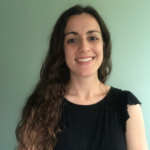 Alexis Kidder is a cognitive neuroscience PhD candidate at Dartmouth College and the National Institute of Mental Health with Dr. Brad Duchaine and Dr. Chris Baker. She received her BA in Psychology from SUNY Geneseo in 2017 before joining the Section on Learning and Plasticity as a post-baccalaureate fellow at the National Institute of Mental Health with Dr. Chris Baker. Alexis’s research focuses on the interaction of the human visual and memory systems during face processing and individual differences in visual abilities. She is also interested in identifying the underlying dimensions used to process visual stimuli and how familiarity impacts this process.
Alexis Kidder is a cognitive neuroscience PhD candidate at Dartmouth College and the National Institute of Mental Health with Dr. Brad Duchaine and Dr. Chris Baker. She received her BA in Psychology from SUNY Geneseo in 2017 before joining the Section on Learning and Plasticity as a post-baccalaureate fellow at the National Institute of Mental Health with Dr. Chris Baker. Alexis’s research focuses on the interaction of the human visual and memory systems during face processing and individual differences in visual abilities. She is also interested in identifying the underlying dimensions used to process visual stimuli and how familiarity impacts this process.
Hilal Nizamoglu
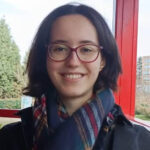 Hilal is a PhD student working under the supervision of Dr. Katharina Dobs in the department of psychology at Justus Liebig University in Giessen, Germany. In her PhD, she seeks to detect the features that give away identity information from facial motions during emotional and communicative facial expression execution. She uses the state-of-the-art computer vision and computer graphics tools as well as DNNs to identify these features in her current research. Since her master’s studies with Dr. Burcu A. Urgen, she has been keenly interested in the action perception field thinking that what else would be a better tool than the actions themselves to study and understand human mind and behavior since action perception involves both low- and high-level visual processing as well as cognitive resources to make inferences. Now, she would like to apply the methods and analyzes predominant in this field to the study of face perception.
Hilal is a PhD student working under the supervision of Dr. Katharina Dobs in the department of psychology at Justus Liebig University in Giessen, Germany. In her PhD, she seeks to detect the features that give away identity information from facial motions during emotional and communicative facial expression execution. She uses the state-of-the-art computer vision and computer graphics tools as well as DNNs to identify these features in her current research. Since her master’s studies with Dr. Burcu A. Urgen, she has been keenly interested in the action perception field thinking that what else would be a better tool than the actions themselves to study and understand human mind and behavior since action perception involves both low- and high-level visual processing as well as cognitive resources to make inferences. Now, she would like to apply the methods and analyzes predominant in this field to the study of face perception.
Julie Ouerfelli-Ethier
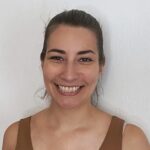 Julie Ouerfelli-Ethier is currently finishing up her PhD work as a postdoctoral fellow at the Vision, Attention and Action Lab at the University of Montreal. She recently obtained a joint PhD from the University Claude-Bernard Lyon 1 and the University of Montreal under the co-supervision of Dr. Laure Pisella and Dr. Aarlenne Khan. During her PhD, Julie investigated eye movements and attention with spatial and motor inhibition tasks in both clinical and non-clinical populations. Broadly, she is interested in understanding the mechanisms underlying target and saccade goal selection. Soon, she will begin a new postdoctoral fellowship under Dr. Martin Rolfs at the Humboldt-Universität zu Berlin and the German Excellence cluster Science of Intelligence.
Julie Ouerfelli-Ethier is currently finishing up her PhD work as a postdoctoral fellow at the Vision, Attention and Action Lab at the University of Montreal. She recently obtained a joint PhD from the University Claude-Bernard Lyon 1 and the University of Montreal under the co-supervision of Dr. Laure Pisella and Dr. Aarlenne Khan. During her PhD, Julie investigated eye movements and attention with spatial and motor inhibition tasks in both clinical and non-clinical populations. Broadly, she is interested in understanding the mechanisms underlying target and saccade goal selection. Soon, she will begin a new postdoctoral fellowship under Dr. Martin Rolfs at the Humboldt-Universität zu Berlin and the German Excellence cluster Science of Intelligence.
2023 FoVea Travel and Networking Award Recipients
FoVea is pleased to announce the winners of our 2023 FoVea Travel and Networking Award.
The FoVea Travel and Networking Award was open to female members of the Vision Science Society (VSS) in pre-doctoral, post-doctoral, and pre-tenure faculty or research scientist positions and intended to cover costs involved in attending the VSS meeting, including membership fees, conference registration fees, and travel expenses.
FoVea created this award as part of its mission to advance the visibility, impact, and success of women in vision science. A recent report from Cooper and Radonjić (2016) indicated that in 2015, the ratio of women to men in VSS was near equal at the pre-doctoral level (1:1.13), but decreased as career stage increased. The decline is symptomatic of forces that impede the professional development of female vision scientists. A key aspect of professional development is building a professional network to support scientific pursuits and to provide mentorship at critical junctions in one’s academic career. The FoVea Travel and Networking Award will help female vision scientists build their professional network by encouraging them to meet with at least one Networking Target at the VSS meeting to discuss their research and consider potential for collaboration.
13 awards were funded by an NSF grant and 1 award was funded by the Visual Cognition journal.
Seoyoung Ahn
 Seoyoung Ahn is a Cognitive Science Ph.D. candidate at Stony Brook University, where she works with Dr. Greg Zelinsky. Her research interests broadly span the understanding of how humans can obtain stable, yet flexible, representations of their visual environment, and using computational models to explain and predict human visual behavior. Currently, she is exploring the use of generative neural networks as a unified underlying mechanism to explain human object-based perception and attention. Her long-term goal is to develop a cognitive-science-driven AI research and training program, pioneering interdisciplinary vision research that combines computational and behavioral approaches. This would enable safer and more effective machine and human interactions in the future. More information about her research can be found at https://ahnchive.github.io/
Seoyoung Ahn is a Cognitive Science Ph.D. candidate at Stony Brook University, where she works with Dr. Greg Zelinsky. Her research interests broadly span the understanding of how humans can obtain stable, yet flexible, representations of their visual environment, and using computational models to explain and predict human visual behavior. Currently, she is exploring the use of generative neural networks as a unified underlying mechanism to explain human object-based perception and attention. Her long-term goal is to develop a cognitive-science-driven AI research and training program, pioneering interdisciplinary vision research that combines computational and behavioral approaches. This would enable safer and more effective machine and human interactions in the future. More information about her research can be found at https://ahnchive.github.io/
Ilona Bloem
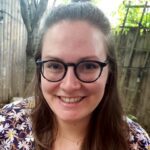 Ilona Bloem is a postdoctoral researcher at the Spinoza Centre for Neuroimaging, working with Serge Dumoulin. She obtained her PhD at Boston University, working with Sam Ling. Afterwards, Ilona did a first postdoc in the labs of Jonathan Winawer and Mike Landy at New York University. Her research focuses on the neural mechanisms underlying perception and cognition. Broadly, she is interested in how our perception of the world around us can be shaped by cognitive influences, such as attention and working memory. The methods she employs span a wide range: functional neuroimaging (fMRI and intracranial EEG) to measure brain responses; psychophysics to measure human behavior; and, computational modeling to link brain and behavior to theoretical models.
Ilona Bloem is a postdoctoral researcher at the Spinoza Centre for Neuroimaging, working with Serge Dumoulin. She obtained her PhD at Boston University, working with Sam Ling. Afterwards, Ilona did a first postdoc in the labs of Jonathan Winawer and Mike Landy at New York University. Her research focuses on the neural mechanisms underlying perception and cognition. Broadly, she is interested in how our perception of the world around us can be shaped by cognitive influences, such as attention and working memory. The methods she employs span a wide range: functional neuroimaging (fMRI and intracranial EEG) to measure brain responses; psychophysics to measure human behavior; and, computational modeling to link brain and behavior to theoretical models.
Vassiki Chauhan
 Dr Vassiki Chauhan is a postdoctoral fellow at Barnard College in the Barnard Vision Lab, led by Dr Alex White. Her work focuses on how the brain allows us to read written language, and how neural responses from text selective regions are modulated by different task demands. During her PhD, under the supervision of Dr James Haxby and Dr Maria Ida Gobbini, she studied responses in the distributed network for face perception to faces embedded in a naturalistic context and perceptual benefits in detecting, identifying and recognizing faces of personally familiar individuals. Across different aspects of her research, she is interested in investigating neural responses to elements of the visual environment that constitute distinct perceptual categories, such as faces and words, which underlie complex behavior, such as the ability to navigate social interactions and to communicate using language. Outside of her scientific work, Vassiki volunteers for the print magazine, Science for the People, and enjoys spending her free time painting, reading, playing RPGs and walking around Manhattan.
Dr Vassiki Chauhan is a postdoctoral fellow at Barnard College in the Barnard Vision Lab, led by Dr Alex White. Her work focuses on how the brain allows us to read written language, and how neural responses from text selective regions are modulated by different task demands. During her PhD, under the supervision of Dr James Haxby and Dr Maria Ida Gobbini, she studied responses in the distributed network for face perception to faces embedded in a naturalistic context and perceptual benefits in detecting, identifying and recognizing faces of personally familiar individuals. Across different aspects of her research, she is interested in investigating neural responses to elements of the visual environment that constitute distinct perceptual categories, such as faces and words, which underlie complex behavior, such as the ability to navigate social interactions and to communicate using language. Outside of her scientific work, Vassiki volunteers for the print magazine, Science for the People, and enjoys spending her free time painting, reading, playing RPGs and walking around Manhattan.
Anna Corriveau
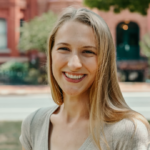 Anna is a third-year PhD student in the Psychology Department at the University of Chicago working with Dr. Monica Rosenberg. She received BAs in Psychology and Neurobiology from the University of Wisconsin-Madison in 2018 before joining the Section on Learning and Plasticity in the National Institute of Mental Health as a post-baccalaureate research fellow under the mentorship of Dr. Chris Baker. Anna’s work aims to understand how sustained attention varies within and across individuals and perceptual modalities. She is interested in using neural and behavioral signatures of sustained attention to build predictive models of attentional performance. Ultimately, she hopes to leverage these models to understand how we focus on information from different perceptual modalities and to predict and avoid upcoming lapses in attention.
Anna is a third-year PhD student in the Psychology Department at the University of Chicago working with Dr. Monica Rosenberg. She received BAs in Psychology and Neurobiology from the University of Wisconsin-Madison in 2018 before joining the Section on Learning and Plasticity in the National Institute of Mental Health as a post-baccalaureate research fellow under the mentorship of Dr. Chris Baker. Anna’s work aims to understand how sustained attention varies within and across individuals and perceptual modalities. She is interested in using neural and behavioral signatures of sustained attention to build predictive models of attentional performance. Ultimately, she hopes to leverage these models to understand how we focus on information from different perceptual modalities and to predict and avoid upcoming lapses in attention.
Michaela DeBolt
 Michaela DeBolt is a PhD candidate and Provost Dissertation Fellow at the University of California, Davis, studying infants’ visual cognitive development. Michaela received her Bachelor’s degree in Psychology from the University of Minnesota, Twin Cities, where she worked with Dr. Vanessa G. Lee and cultivated her passion for studying visual attention. After completing her undergraduate degree, Michaela joined Dr. Lisa Oakes’ lab at UC Davis, where she is currently pursuing her PhD in Developmental Psychology. Her research investigates infants’ cognitive and perceptual abilities, with a particular focus on attention and learning. In addition, Michaela has a passion for science reform and critically evaluating and improving methods for measuring infants’ looking behavior. Her dissertation centers on understanding how contextual influences can shape infants’ developing spatial attention skills and how publication and sampling biases can impact our interpretation of cross-cultural findings.
Michaela DeBolt is a PhD candidate and Provost Dissertation Fellow at the University of California, Davis, studying infants’ visual cognitive development. Michaela received her Bachelor’s degree in Psychology from the University of Minnesota, Twin Cities, where she worked with Dr. Vanessa G. Lee and cultivated her passion for studying visual attention. After completing her undergraduate degree, Michaela joined Dr. Lisa Oakes’ lab at UC Davis, where she is currently pursuing her PhD in Developmental Psychology. Her research investigates infants’ cognitive and perceptual abilities, with a particular focus on attention and learning. In addition, Michaela has a passion for science reform and critically evaluating and improving methods for measuring infants’ looking behavior. Her dissertation centers on understanding how contextual influences can shape infants’ developing spatial attention skills and how publication and sampling biases can impact our interpretation of cross-cultural findings.
Evi Hendrikx
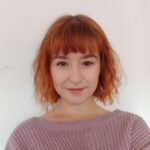 Evi Hendrikx is a third-year PhD student at the department of Experimental Psychology at Utrecht University, (co-)supervised by Dr. Ben Harvey, Dr. Nathan van der Stoep and Dr. Stefan van der Stigchel. Her PhD centers around responses to visual event timing across the human cortex. She is also interested in responses to other quantities, particularly the potential parallels and interactions in their processing. Using 7-Tesla fMRI and neural model-based analyses she investigates how such responses and/or the relationships between them progress over their respective processing hierarchies. She obtained her BSc Psychobiology and MSc Brain and Cognitive Sciences at the University of Amsterdam.
Evi Hendrikx is a third-year PhD student at the department of Experimental Psychology at Utrecht University, (co-)supervised by Dr. Ben Harvey, Dr. Nathan van der Stoep and Dr. Stefan van der Stigchel. Her PhD centers around responses to visual event timing across the human cortex. She is also interested in responses to other quantities, particularly the potential parallels and interactions in their processing. Using 7-Tesla fMRI and neural model-based analyses she investigates how such responses and/or the relationships between them progress over their respective processing hierarchies. She obtained her BSc Psychobiology and MSc Brain and Cognitive Sciences at the University of Amsterdam.
Brianna Hunter
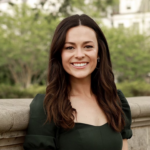 Brianna Hunter is a postdoctoral scholar at the UC Davis Center for Mind and Brain working with Drs. Lisa Oakes and Steve Luck. She earned her Ph.D. in Psychological Sciences from Tulane University in 2022. Prior to her doctoral work, she graduated summa cum laude from the University of Florida in 2017 with a B.S. in Behavioral and Cognitive Neuroscience. Brianna is broadly interested in the reciprocal relationship between attention and learning during infancy. Brianna’s current research uses eye tracking and computational modeling approaches to understand how infants’ unique experiences shape the way they visually explore naturalistic scenes.
Brianna Hunter is a postdoctoral scholar at the UC Davis Center for Mind and Brain working with Drs. Lisa Oakes and Steve Luck. She earned her Ph.D. in Psychological Sciences from Tulane University in 2022. Prior to her doctoral work, she graduated summa cum laude from the University of Florida in 2017 with a B.S. in Behavioral and Cognitive Neuroscience. Brianna is broadly interested in the reciprocal relationship between attention and learning during infancy. Brianna’s current research uses eye tracking and computational modeling approaches to understand how infants’ unique experiences shape the way they visually explore naturalistic scenes.
Samantha Jenks
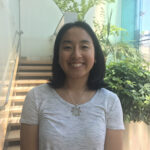 Samantha Jenks is a third-year graduate student from the Brain and Cognitive Science Department at the University of Rochester. She works with Dr. Martina Poletti in the Active Perception Lab and is currently investigating the sensitivity of multiple locations within the 1-degree foveola. Specifically, she studies the sensitivity differences along a given eccentricity in the foveola utilizing a custom-built high precision eye tracker and gaze contingent display control. Her interests also involve looking at the neuronal underpinnings of these sensitivity differences. As a result, she also uses an adaptive optics scanning laser ophthalmoscopy (AOSLO) to take pictures of the retina in order to correlate cone density with sensitivity at the behavioral level.
Samantha Jenks is a third-year graduate student from the Brain and Cognitive Science Department at the University of Rochester. She works with Dr. Martina Poletti in the Active Perception Lab and is currently investigating the sensitivity of multiple locations within the 1-degree foveola. Specifically, she studies the sensitivity differences along a given eccentricity in the foveola utilizing a custom-built high precision eye tracker and gaze contingent display control. Her interests also involve looking at the neuronal underpinnings of these sensitivity differences. As a result, she also uses an adaptive optics scanning laser ophthalmoscopy (AOSLO) to take pictures of the retina in order to correlate cone density with sensitivity at the behavioral level.
Natalia Khodayari
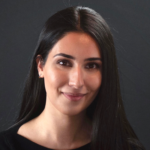 Natalia Khodayari is a third-year PhD candidate co-advised by Drs. Susan Courtney and Howard Egeth in the Department of Psychological and Brain Sciences at Johns Hopkins University. Her research focuses on investigating the neural mechanisms of visual attention, particularly that of target enhancement and distractor suppression using various methodological (behavioral, neuro-imaging, and computational) and design (group- and individual-differences) approaches. She is currently behaviorally investigating whether separable neural mechanisms of enhancement and suppression exist using an individual differences approach and is excited to extend this project to EEG. She aims to apply her research to improve educational equity, occupational safety, and pharmacological efficacy. Natalia received her B.S. in Neurobiology, Physiology and Behavior from UC Davis and her M.A. in Psychology from Johns Hopkins. She previously served as an undergraduate research assistant advised by Drs. Ron Mangun and Steve Luck and, upon graduation, as a Junior Specialist under Dr. Tamara Swaab.
Natalia Khodayari is a third-year PhD candidate co-advised by Drs. Susan Courtney and Howard Egeth in the Department of Psychological and Brain Sciences at Johns Hopkins University. Her research focuses on investigating the neural mechanisms of visual attention, particularly that of target enhancement and distractor suppression using various methodological (behavioral, neuro-imaging, and computational) and design (group- and individual-differences) approaches. She is currently behaviorally investigating whether separable neural mechanisms of enhancement and suppression exist using an individual differences approach and is excited to extend this project to EEG. She aims to apply her research to improve educational equity, occupational safety, and pharmacological efficacy. Natalia received her B.S. in Neurobiology, Physiology and Behavior from UC Davis and her M.A. in Psychology from Johns Hopkins. She previously served as an undergraduate research assistant advised by Drs. Ron Mangun and Steve Luck and, upon graduation, as a Junior Specialist under Dr. Tamara Swaab.
Lisa Kroell
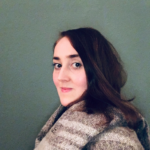 Lisa Kroell is a final-year PhD student in the group of Prof. Martin Rolfs at Humboldt-University of Berlin. While she is interested in all things eye movements, her research focusses on the dynamics of foveal vision immediately before large-scale saccades: Using psychophysical methods, she investigates how the features of a peripheral eye movement target predictively shape perception in the center of gaze. Lisa also has a keen interest in pre-saccadic attention, the influence of natural scene statistics on oculomotor behavior, and animal models of active vision. She received her BSc in Psychology and her MSc in Neuroscience from Ludwig-Maximilians-University Munich.
Lisa Kroell is a final-year PhD student in the group of Prof. Martin Rolfs at Humboldt-University of Berlin. While she is interested in all things eye movements, her research focusses on the dynamics of foveal vision immediately before large-scale saccades: Using psychophysical methods, she investigates how the features of a peripheral eye movement target predictively shape perception in the center of gaze. Lisa also has a keen interest in pre-saccadic attention, the influence of natural scene statistics on oculomotor behavior, and animal models of active vision. She received her BSc in Psychology and her MSc in Neuroscience from Ludwig-Maximilians-University Munich.
Florencia Martinez Addiego
 Flo is a third-year PhD candidate in the Interdisciplinary Program in Neuroscience at Georgetown University under the co-supervision of Drs. Ella Striem-Amit and Max Riesenhuber. She earned dual BS degrees in Neurobiology and Mathematics from Georgetown University in 2020. As an undergraduate, Flo studied the neural correlates and brain volumetric changes of Chronic Fatigue Syndrome and Gulf War Illness with Dr. James Baraniuk which resulted in multiple co-authored publications including one first-author paper. Flo’s current research leverages fMRI to investigate the neural correlates of action representations, and the existence of abstract action representations. She is very interested in understanding how a hierarchical structure, as has been proposed for visual object recognition, may be leveraged in action observation and action execution to facilitate generalization.
Flo is a third-year PhD candidate in the Interdisciplinary Program in Neuroscience at Georgetown University under the co-supervision of Drs. Ella Striem-Amit and Max Riesenhuber. She earned dual BS degrees in Neurobiology and Mathematics from Georgetown University in 2020. As an undergraduate, Flo studied the neural correlates and brain volumetric changes of Chronic Fatigue Syndrome and Gulf War Illness with Dr. James Baraniuk which resulted in multiple co-authored publications including one first-author paper. Flo’s current research leverages fMRI to investigate the neural correlates of action representations, and the existence of abstract action representations. She is very interested in understanding how a hierarchical structure, as has been proposed for visual object recognition, may be leveraged in action observation and action execution to facilitate generalization.
Anna McCarter
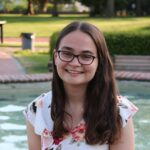 Anna McCarter received her BS and MS in Neuroscience from the University of Delaware where she worked with Dr. Tim Vickery. Her work there focused on visual working memory, visual statistical learning, and reinforcement learning. Anna is currently a PhD Candidate in the Cognition and Cognitive Neuroscience Program at the University of Massachusetts at Amherst where she works with Dr. Jeffrey Starns. She is primarily interested in ways to improve visual long-term memory. Her recent work showed that, unexpectedly, the testing effect does not apply to novel, visual stimuli. Anna’s dissertation focuses on how drawing and tracing are beneficial for visual long-term memory in young adults, older adults, and people with Alzheimer’s disease.
Anna McCarter received her BS and MS in Neuroscience from the University of Delaware where she worked with Dr. Tim Vickery. Her work there focused on visual working memory, visual statistical learning, and reinforcement learning. Anna is currently a PhD Candidate in the Cognition and Cognitive Neuroscience Program at the University of Massachusetts at Amherst where she works with Dr. Jeffrey Starns. She is primarily interested in ways to improve visual long-term memory. Her recent work showed that, unexpectedly, the testing effect does not apply to novel, visual stimuli. Anna’s dissertation focuses on how drawing and tracing are beneficial for visual long-term memory in young adults, older adults, and people with Alzheimer’s disease.
Sanika Paranjape
 Sanika graduated from Case Western Reserve University in 2019 with a BS in Biology and Cognitive Science. She then worked as a postbac researcher at the National Institute of Mental Health with Dr. Chris Baker. In his lab she studied face and object perception, and became more interested in cognitive neuroscience, especially vision research. Currently, Sanika is a second-year graduate student at The George Washington University in the labs of Dr. Sarah Shomstein and Dr. Dwight Kravitz. She is interested in studying how visual working memory interacts with and influences the perception of faces, high-level judgments, and other complex stimuli.
Sanika graduated from Case Western Reserve University in 2019 with a BS in Biology and Cognitive Science. She then worked as a postbac researcher at the National Institute of Mental Health with Dr. Chris Baker. In his lab she studied face and object perception, and became more interested in cognitive neuroscience, especially vision research. Currently, Sanika is a second-year graduate student at The George Washington University in the labs of Dr. Sarah Shomstein and Dr. Dwight Kravitz. She is interested in studying how visual working memory interacts with and influences the perception of faces, high-level judgments, and other complex stimuli.
Tess White
 Tess is currently a 1st year graduate student in the Cognitive Brain Sciences program at the University of Nevada, Reno. Her current interests include object perception, occlusion and the viability of tripolar EEG as an effective neuroimaging technique in vision science under the mentorship of Dr. Gideon P. Caplovitz. She is currently researching new constraints to amodal completion models. She has worked with Dr. Bill Warren studying human navigation, and Dr. David Sheinberg studying the effects of dynamic stimuli on visual search tasks, both at Brown University. She was a long time member of the Attention in the Brain EPSCoR consortium led by Dr. Peter U. Tse at Dartmouth University.
Tess is currently a 1st year graduate student in the Cognitive Brain Sciences program at the University of Nevada, Reno. Her current interests include object perception, occlusion and the viability of tripolar EEG as an effective neuroimaging technique in vision science under the mentorship of Dr. Gideon P. Caplovitz. She is currently researching new constraints to amodal completion models. She has worked with Dr. Bill Warren studying human navigation, and Dr. David Sheinberg studying the effects of dynamic stimuli on visual search tasks, both at Brown University. She was a long time member of the Attention in the Brain EPSCoR consortium led by Dr. Peter U. Tse at Dartmouth University.
2022 FoVea Travel and Networking Award Recipients
FoVea is pleased to announce the winners of our 2022 FoVea Travel and Networking Award.
The FoVea Travel and Networking Award was open to female members of the Vision Science Society (VSS) in pre-doctoral, post-doctoral, and pre-tenure faculty or research scientist positions and intended to cover costs involved in attending the VSS meeting, including membership fees, conference registration fees, and travel expenses.
FoVea created this award as part of its mission to advance the visibility, impact, and success of women in vision science. A recent report from Cooper and Radonjić (2016) indicated that in 2015, the ratio of women to men in VSS was near equal at the pre-doctoral level (1:1.13), but decreased as career stage increased. The decline is symptomatic of forces that impede the professional development of female vision scientists. A key aspect of professional development is building a professional network to support scientific pursuits and to provide mentorship at critical junctions in one’s academic career. The FoVea Travel and Networking Award will help female vision scientists build their professional network by encouraging them to meet with at least one Networking Target at the VSS meeting to discuss their research and consider potential for collaboration.
6 awards were funded by an NSF grant and 1 award was funded by the Visual Cognition journal.
Avi Aizenman
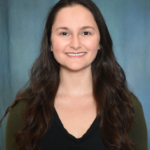 Avi is an Alexander von Humboldt Research Fellow in Germany, currently working in the lab of Professor Karl Gegenfurtner at the University of Giessen. She is currently investigating the eye and head movements coordinated in virtual reality, as well as color categorization in virtual environments. Avi is broadly interested in understanding how gaze behavior explains our perception of the visual world. She received her PhD in Vision Science from UC Berkeley where she worked with Professors Dennis Levi and Marty Banks on projects related to understanding how oculomotor deficits impact vision in Amblyopia and quantifying differences in gaze behavior between natural and virtual environments. Prior to this, Avi worked as a research assistant in Dr. Jeremy Wolfe’s Visual Attention Lab at Harvard Medical School on projects investigating radiological search. She completed her Bachelor’s degree at Brandeis University working with Professor Robert Sekuler on understanding audiovisual integration and the role of musicianship.
Avi is an Alexander von Humboldt Research Fellow in Germany, currently working in the lab of Professor Karl Gegenfurtner at the University of Giessen. She is currently investigating the eye and head movements coordinated in virtual reality, as well as color categorization in virtual environments. Avi is broadly interested in understanding how gaze behavior explains our perception of the visual world. She received her PhD in Vision Science from UC Berkeley where she worked with Professors Dennis Levi and Marty Banks on projects related to understanding how oculomotor deficits impact vision in Amblyopia and quantifying differences in gaze behavior between natural and virtual environments. Prior to this, Avi worked as a research assistant in Dr. Jeremy Wolfe’s Visual Attention Lab at Harvard Medical School on projects investigating radiological search. She completed her Bachelor’s degree at Brandeis University working with Professor Robert Sekuler on understanding audiovisual integration and the role of musicianship.
Jasmine Awad
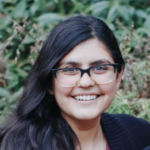 Jasmine Awad is a 4th year doctoral student in the Cognition & Perception Psychology program at the University of Washington. Her interests lie in leveraging her experience as a CODA (child of deaf adults) and expertise in visual perception to improve and promote accessibility and equity in learning and the development of technologies for differently abled populations. Under the mentorship of Dr. Ione Fine, her current research is designed to understand the performance gap seen in mathematical achievement between Deaf/Hard of hearing students and their hearing peers by exploring differences in cognitive processes (such as working memory & the visual spatial sketchpad) and potential visual attentional bottlenecks in Sign Language users during learning.
Jasmine Awad is a 4th year doctoral student in the Cognition & Perception Psychology program at the University of Washington. Her interests lie in leveraging her experience as a CODA (child of deaf adults) and expertise in visual perception to improve and promote accessibility and equity in learning and the development of technologies for differently abled populations. Under the mentorship of Dr. Ione Fine, her current research is designed to understand the performance gap seen in mathematical achievement between Deaf/Hard of hearing students and their hearing peers by exploring differences in cognitive processes (such as working memory & the visual spatial sketchpad) and potential visual attentional bottlenecks in Sign Language users during learning.
Angelica Godinez
 Angie is a postdoctoral researcher working in Martin Rolfs’ Active perception and Cognition lab at Humboldt-Universität zu Berlin and in the German Excellence cluster Science of Intelligence. Prior to her
Angie is a postdoctoral researcher working in Martin Rolfs’ Active perception and Cognition lab at Humboldt-Universität zu Berlin and in the German Excellence cluster Science of Intelligence. Prior to her
postdoc, Angie received a BS in Psychology and MS in Human Factors and Ergonomics from San Jose State University. During this time, she worked at NASA Ames Research Center with Leland Stone and Dorion Liston. For her PhD at the University of California, Berkeley she worked with Dennis M. Levi on the impact, recovery and possible adaptations of poor binocular vision. Broadly speaking, she is interested in how we process 3D visual information and use that for planning and executing manual
motor movements.
Shui’Er Han
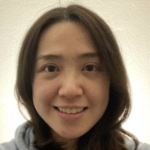 Shui’Er Han is a Postdoctoral Scholar in Prof. Duje Tadin’s lab at the University of Rochester, New York. A mentee of Professor David Alais, she completed her PhD at the University of Sydney in 2019. During her candidature, she studied the underlying mechanisms of continuous flash suppression (CFS), a potent form of dichoptic stimulation, using image processing and Fast Fourier Transform analyses as the mainstay approaches. In her first postdoc position with Prof. Frans Verstraten, she applied her experience with CFS in short-term monocular deprivation, investigating its spatial specificity in Virtual Reality (VR). Her current position is funded by an international fellowship from the Singapore’s A*STAR, and her work uses VR to study different perceptual phenomena (e.g., binocular rivalry) under naturalistic environments. She also employs VR to conduct perceptual training and to evaluate optical solutions (e.g., peripheral displays and vergence-accommodation conflict).
Shui’Er Han is a Postdoctoral Scholar in Prof. Duje Tadin’s lab at the University of Rochester, New York. A mentee of Professor David Alais, she completed her PhD at the University of Sydney in 2019. During her candidature, she studied the underlying mechanisms of continuous flash suppression (CFS), a potent form of dichoptic stimulation, using image processing and Fast Fourier Transform analyses as the mainstay approaches. In her first postdoc position with Prof. Frans Verstraten, she applied her experience with CFS in short-term monocular deprivation, investigating its spatial specificity in Virtual Reality (VR). Her current position is funded by an international fellowship from the Singapore’s A*STAR, and her work uses VR to study different perceptual phenomena (e.g., binocular rivalry) under naturalistic environments. She also employs VR to conduct perceptual training and to evaluate optical solutions (e.g., peripheral displays and vergence-accommodation conflict).
Simran Purokayastha
 Simran Purokayastha is pursuing her PhD in Cognition and Perception at the Department of Psychology, New York University (NYU), under the advisorship of Prof. Marisa Carrasco. She holds a BA (Honors) in Psychology from Christ University (Bangalore, India), and an MSc in Human Cognitive Neuropsychology from the University of Edinburgh (Edinburgh, UK). She has previously studied conscious processing using binocular rivalry; the role of saccadic inhibition in voluntary saccade reorienting; and human gaze strategies in a custom-designed change blindness task. Her research immediately before NYU focused on identifying potential biomarkers of Alzheimer’s disease using multimodal techniques – including PET, (f)MRI, EEG and standard psychometric evaluations – as part of a large, longitudinal study that is still ongoing. In her PhD research, she uses psychophysics to study robust asymmetries around the visual field and whether inherent and trained mechanisms (fixational eye movements and attention) can ameliorate the effects of these asymmetries. Simran is also passionate about helping create a more diverse STEM workforce that is inclusive of underrepresented voices and works actively in her department to facilitate this vision.
Simran Purokayastha is pursuing her PhD in Cognition and Perception at the Department of Psychology, New York University (NYU), under the advisorship of Prof. Marisa Carrasco. She holds a BA (Honors) in Psychology from Christ University (Bangalore, India), and an MSc in Human Cognitive Neuropsychology from the University of Edinburgh (Edinburgh, UK). She has previously studied conscious processing using binocular rivalry; the role of saccadic inhibition in voluntary saccade reorienting; and human gaze strategies in a custom-designed change blindness task. Her research immediately before NYU focused on identifying potential biomarkers of Alzheimer’s disease using multimodal techniques – including PET, (f)MRI, EEG and standard psychometric evaluations – as part of a large, longitudinal study that is still ongoing. In her PhD research, she uses psychophysics to study robust asymmetries around the visual field and whether inherent and trained mechanisms (fixational eye movements and attention) can ameliorate the effects of these asymmetries. Simran is also passionate about helping create a more diverse STEM workforce that is inclusive of underrepresented voices and works actively in her department to facilitate this vision.
Sophia Robert
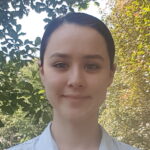 Sophia Robert received her B.A. (2018) in Biology and Philosophy from Williams College, focusing on philosophical foundations of cognitive science and evolutionary biology. She came to love vision while at the NIH as a postbac thanks to Dr. Leslie G. Ungerleider, under whom she studied curvature and animacy processing in macaques and humans. Sophia is currently a second-year graduate student in the Psychology Department at Carnegie Mellon University, pursuing her PhD in Cognitive Neuroscience with the guidance of Drs. Marlene Behrmann and Michael J Tarr. She is generally interested in the interaction between lower-level visual features of objects and their mental and topographical representations in the visual cortices of neurotypical and atypical populations. Her current work utilizes a naturalistic viewing paradigm with fMRI to investigate differences in the functional organization of the brains of patients who have undergone extensive cortical resections in childhood to understand the principles guiding cortical (re)organization.
Sophia Robert received her B.A. (2018) in Biology and Philosophy from Williams College, focusing on philosophical foundations of cognitive science and evolutionary biology. She came to love vision while at the NIH as a postbac thanks to Dr. Leslie G. Ungerleider, under whom she studied curvature and animacy processing in macaques and humans. Sophia is currently a second-year graduate student in the Psychology Department at Carnegie Mellon University, pursuing her PhD in Cognitive Neuroscience with the guidance of Drs. Marlene Behrmann and Michael J Tarr. She is generally interested in the interaction between lower-level visual features of objects and their mental and topographical representations in the visual cortices of neurotypical and atypical populations. Her current work utilizes a naturalistic viewing paradigm with fMRI to investigate differences in the functional organization of the brains of patients who have undergone extensive cortical resections in childhood to understand the principles guiding cortical (re)organization.
Stephanie Shields
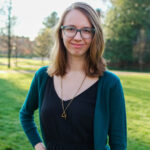 Stephanie Shields is a fourth-year neuroscience PhD candidate at The University of Texas at Austin, co-advised by Drs. Lawrence Cormack and Alex Huk. She received a BS in Psychology from Roanoke College in 2017, where she worked with Dr. David Nichols, and she received a 2017-18 Fulbright Study/Research Award that allowed her to work with Dr. Lutz Wiegrebe at Ludwig-Maximilians-Universität München. Stephanie is interested in using psychophysics and computational modeling to study how sensory information is processed in neural circuits to support perception, particularly stereoscopic perception. Her dissertation research focuses on the impact of environment-to-retinae geometry on the encoding and perception of 3D orientation. She is an NSF Graduate Research Fellow and an incoming member of VSS’s Student-Postdoc Advisory Committee.
Stephanie Shields is a fourth-year neuroscience PhD candidate at The University of Texas at Austin, co-advised by Drs. Lawrence Cormack and Alex Huk. She received a BS in Psychology from Roanoke College in 2017, where she worked with Dr. David Nichols, and she received a 2017-18 Fulbright Study/Research Award that allowed her to work with Dr. Lutz Wiegrebe at Ludwig-Maximilians-Universität München. Stephanie is interested in using psychophysics and computational modeling to study how sensory information is processed in neural circuits to support perception, particularly stereoscopic perception. Her dissertation research focuses on the impact of environment-to-retinae geometry on the encoding and perception of 3D orientation. She is an NSF Graduate Research Fellow and an incoming member of VSS’s Student-Postdoc Advisory Committee.
2021 FoVea Travel and Networking Award Recipients
FoVea is pleased to announce the winners of our 2021 FoVea Travel and Networking Award.
The FoVea Travel and Networking Award was open to female members of the Vision Science Society (VSS) in pre-doctoral, post-doctoral, and pre-tenure faculty or research scientist positions and intended to cover costs involved in attending the VSS meeting, including membership fees, conference registration fees, and travel expenses. This year due to the virtual nature of the meeting, the awards covered the costs of VSS membership fees and conference fees.
FoVea created this award as part of its mission to advance the visibility, impact, and success of women in vision science. A recent report from Cooper and Radonjić (2016) indicated that in 2015, the ratio of women to men in VSS was near equal at the pre-doctoral level (1:1.13), but decreased as career stage increased. The decline is symptomatic of forces that impede the professional development of female vision scientists. A key aspect of professional development is building a professional network to support scientific pursuits and to provide mentorship at critical junctions in one’s academic career. The FoVea Travel and Networking Award will help female vision scientists build their professional network by encouraging them to meet with at least one Networking Target at the VSS meeting to discuss their research and consider potential for collaboration.
10 awards were funded by an NSF grant and 3 awards were funded by the Visual Cognition journal.
Sponsored by NSF
Sarah Cormiea
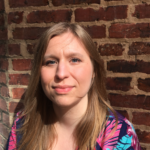 Sarah Cormiea is a graduate student in the Department of Psychological & Brain Sciences at Johns Hopkins. As a member of the Dynamic Perception Lab, she spends a lot of time thinking about how we extract coherent impressions of the world from a chaotic sensory landscape. Her research focuses on the ways people perceive, describe, and think about odors. In a previous set of experiments, she found that participants’ mental representations of everyday smells (e.g., banana, coffee, bacon, grass, beer) changed when they were paired with verbal labels. More recently, she has been asking people to try to identify odors in the absence of visual or context clues. The types of answers people give (even the wrong answers) offer a unique window into their olfactory perceptual experience. Going forward, Sarah hopes to continue exploring how human olfaction interacts with vision, language, and other higher-level cognitive abilities.
Sarah Cormiea is a graduate student in the Department of Psychological & Brain Sciences at Johns Hopkins. As a member of the Dynamic Perception Lab, she spends a lot of time thinking about how we extract coherent impressions of the world from a chaotic sensory landscape. Her research focuses on the ways people perceive, describe, and think about odors. In a previous set of experiments, she found that participants’ mental representations of everyday smells (e.g., banana, coffee, bacon, grass, beer) changed when they were paired with verbal labels. More recently, she has been asking people to try to identify odors in the absence of visual or context clues. The types of answers people give (even the wrong answers) offer a unique window into their olfactory perceptual experience. Going forward, Sarah hopes to continue exploring how human olfaction interacts with vision, language, and other higher-level cognitive abilities.
Catherine Dowell
 Catherine Dowell is a PhD candidate in the School of Psychology at the University of Southern Mississippi working with Dr. Alen Hajnal. She is currently interested in studying the perception of novel 3-D objects, and the acquisition and utilization of affordance perception of complex objects. To study this, she uses unique objects known as “feelies”, which were originally developed by James J. Gibson, to determine how perceived affordances are influenced by changes in modality, exploratory activity, and object characteristics. She is also interested in how perceptual abilities (in particular, affordance perception), can develop and change through learning and aging. She obtained her BS in Psychology, and her MS in Psychological Science at Western Kentucky University.
Catherine Dowell is a PhD candidate in the School of Psychology at the University of Southern Mississippi working with Dr. Alen Hajnal. She is currently interested in studying the perception of novel 3-D objects, and the acquisition and utilization of affordance perception of complex objects. To study this, she uses unique objects known as “feelies”, which were originally developed by James J. Gibson, to determine how perceived affordances are influenced by changes in modality, exploratory activity, and object characteristics. She is also interested in how perceptual abilities (in particular, affordance perception), can develop and change through learning and aging. She obtained her BS in Psychology, and her MS in Psychological Science at Western Kentucky University.
Haydée G Garcia Lazaro
 Haydée García-Lázaro is a postdoctoral researcher at the Smith Kettlewell Eye Research Institute in San Francisco, California, working with Dr Santani Teng. Her current research is focused on the neural mechanisms of reverberant auditory perception, echolocation and navigation in blind and sighted populations. To accomplish this, Haydée uses psychophysics, electrophysiological techniques (M/EEG) and computational modelling. In a second line of research, and as an extension of her doctoral research, Haydée is also interested in the neural mechanisms behind auditory and visual attention in humans. Haydée received her PhD from the Otto von-Guericke University of Magdeburg, Germany, working with Prof. Dr Jens-Max Hopf. Her graduate work focused on dissociating feature-based selection of attention and reward-based selection in visual cortical areas using psychophysics and M/EEG.
Haydée García-Lázaro is a postdoctoral researcher at the Smith Kettlewell Eye Research Institute in San Francisco, California, working with Dr Santani Teng. Her current research is focused on the neural mechanisms of reverberant auditory perception, echolocation and navigation in blind and sighted populations. To accomplish this, Haydée uses psychophysics, electrophysiological techniques (M/EEG) and computational modelling. In a second line of research, and as an extension of her doctoral research, Haydée is also interested in the neural mechanisms behind auditory and visual attention in humans. Haydée received her PhD from the Otto von-Guericke University of Magdeburg, Germany, working with Prof. Dr Jens-Max Hopf. Her graduate work focused on dissociating feature-based selection of attention and reward-based selection in visual cortical areas using psychophysics and M/EEG.
Hanna Haponenko
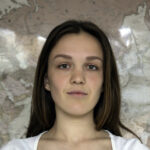 Hanna Haponenko is a third-year PhD student studying Human Cognition and Perception at McMaster University, from where she also obtained her Bachelor of Health Sciences Degree in 2013. Her undergraduate honours thesis focused on enhancing community connectedness through business development ventures in the north end of Hamilton. Hanna has most recently married her love of researching human attention with her business interests into managing a startup called Axcessiom Technologies. At Axcessiom, Hanna applies principles of human and computer vision to lead the development of a facial gesture recognition device used by drivers with disabilities to activate functions like windshield wipers and turn signals with simple facial expressions. Hanna is most passionate about designing effective human machine interfaces, wrangling and analyzing data to make valuable insights, and exploring ways to increase trust between humans and autonomous vehicles.
Hanna Haponenko is a third-year PhD student studying Human Cognition and Perception at McMaster University, from where she also obtained her Bachelor of Health Sciences Degree in 2013. Her undergraduate honours thesis focused on enhancing community connectedness through business development ventures in the north end of Hamilton. Hanna has most recently married her love of researching human attention with her business interests into managing a startup called Axcessiom Technologies. At Axcessiom, Hanna applies principles of human and computer vision to lead the development of a facial gesture recognition device used by drivers with disabilities to activate functions like windshield wipers and turn signals with simple facial expressions. Hanna is most passionate about designing effective human machine interfaces, wrangling and analyzing data to make valuable insights, and exploring ways to increase trust between humans and autonomous vehicles.
Zoey Isherwood
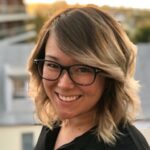 Zoey Isherwood is currently a Postdoctoral Scholar in Prof. Michael Webster’s lab at the University of Nevada, Reno. She received her PhD at UNSW Sydney in 2019 under the supervision of Prof. Branka Spehar and Dr. Mark Schira. Shortly afterwards, she started her first postdoc position at the University of Wollongong, staying on in Dr. Mark Schira’s lab. During her PhD she focused on researching the visual processing and aesthetic appreciation of natural scene statistics (specifically the 1/f amplitude spectrum) using neuroimaging and psychophysical techniques. In her first postdoc position, she worked on processing high resolution 7T MRI data as part of the development of an in vivo high resolution human brain atlas. In her current postdoc position, she has shifted gears back to vision research, and is using neuroimaging techniques to investigate the cortical underpinnings of colour processing and compensation in colour deficiencies such as anomalous trichromacy.
Zoey Isherwood is currently a Postdoctoral Scholar in Prof. Michael Webster’s lab at the University of Nevada, Reno. She received her PhD at UNSW Sydney in 2019 under the supervision of Prof. Branka Spehar and Dr. Mark Schira. Shortly afterwards, she started her first postdoc position at the University of Wollongong, staying on in Dr. Mark Schira’s lab. During her PhD she focused on researching the visual processing and aesthetic appreciation of natural scene statistics (specifically the 1/f amplitude spectrum) using neuroimaging and psychophysical techniques. In her first postdoc position, she worked on processing high resolution 7T MRI data as part of the development of an in vivo high resolution human brain atlas. In her current postdoc position, she has shifted gears back to vision research, and is using neuroimaging techniques to investigate the cortical underpinnings of colour processing and compensation in colour deficiencies such as anomalous trichromacy.
Yih-Shiuan Lin
 Yih-Shiuan Lin is a PhD candidate working in the lab of Prof. Mark Greenlee in the Department of Experimental Psychology at University of Regensburg in Germany. Her PhD work focuses on investigating lateral modulation in human vision such as exhibited in filling-in by means of psychophysics, computational modeling, and fMRI. Her PhD project is part of the collaboration between the lab of Prof. Greenlee and the lab of Prof. Chien-Chung Chen in National Taiwan University. At the same time, she has been working with Dr. Maka Malania on a project involving understanding the effect of perceptual learning on visual crowding. She has also gained research experience in a broad range of topics like binocular vision, perceptual grouping, and color vision during her master’s years in National Taiwan University. In addition, she is very interested in learning how to apply machine learning techniques for advanced data analysis in her own studies.
Yih-Shiuan Lin is a PhD candidate working in the lab of Prof. Mark Greenlee in the Department of Experimental Psychology at University of Regensburg in Germany. Her PhD work focuses on investigating lateral modulation in human vision such as exhibited in filling-in by means of psychophysics, computational modeling, and fMRI. Her PhD project is part of the collaboration between the lab of Prof. Greenlee and the lab of Prof. Chien-Chung Chen in National Taiwan University. At the same time, she has been working with Dr. Maka Malania on a project involving understanding the effect of perceptual learning on visual crowding. She has also gained research experience in a broad range of topics like binocular vision, perceptual grouping, and color vision during her master’s years in National Taiwan University. In addition, she is very interested in learning how to apply machine learning techniques for advanced data analysis in her own studies.
Melisa Menceloglu
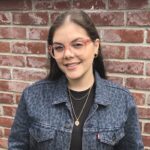 Melisa Menceloglu is a Postdoctoral Research Associate in the Department of Cognitive, Linguistic & Psychological Sciences at Brown University, working with Dr. Joo-Hyun Song. She received her PhD in Psychology in 2020 from Northwestern University, working with Dr. Satoru Suzuki and Dr. Marcia Grabowecky. Melisa’s research focuses on perception, action, and attentional processes in the temporal domain. She uses behavioral methods including continuous movement tracking and EEG to understand how we generate expectations about timing of events and orient attention to specific points in time, and how auditory and visual perceptual processes and goal-directed action are altered with temporal orienting of attention.
Melisa Menceloglu is a Postdoctoral Research Associate in the Department of Cognitive, Linguistic & Psychological Sciences at Brown University, working with Dr. Joo-Hyun Song. She received her PhD in Psychology in 2020 from Northwestern University, working with Dr. Satoru Suzuki and Dr. Marcia Grabowecky. Melisa’s research focuses on perception, action, and attentional processes in the temporal domain. She uses behavioral methods including continuous movement tracking and EEG to understand how we generate expectations about timing of events and orient attention to specific points in time, and how auditory and visual perceptual processes and goal-directed action are altered with temporal orienting of attention.
Samantha Montoya
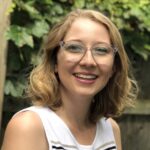 Samantha A. Montoya is a second-year student in the Neuroscience Graduate Program at the University of Minnesota, supervised by Dr. Michael-Paul Schallmo and Dr. Stephen Engel. Samantha studies visual perception, with a particular interest in populations who experience altered visual perception. She is currently studying visual processing and perception in people with psychosis using behavior, neuroimaging (fMRI), and electroencephalography (EEG). She is also planning to apply behavioral and neuroimaging methods to study Visual Snow Syndrome—a condition characterized by the experience of persistent flickering specks covering the entire visual field. In addition to her research, Samantha uses art to communicate scientific findings with the community and advocate for people with visual disabilities. Samantha received her B.A. in Neuroscience and Studio Art from Kenyon College in 2019.
Samantha A. Montoya is a second-year student in the Neuroscience Graduate Program at the University of Minnesota, supervised by Dr. Michael-Paul Schallmo and Dr. Stephen Engel. Samantha studies visual perception, with a particular interest in populations who experience altered visual perception. She is currently studying visual processing and perception in people with psychosis using behavior, neuroimaging (fMRI), and electroencephalography (EEG). She is also planning to apply behavioral and neuroimaging methods to study Visual Snow Syndrome—a condition characterized by the experience of persistent flickering specks covering the entire visual field. In addition to her research, Samantha uses art to communicate scientific findings with the community and advocate for people with visual disabilities. Samantha received her B.A. in Neuroscience and Studio Art from Kenyon College in 2019.
Lynn Sörensen

Lynn K. A. Sörensen is a fourth-year graduate student at the University of Amsterdam jointly supervised by Dr. Steven Scholte, Dr. Sander Bohté and Dr. Heleen Slagter. In her research, she integrates ideas and methods from psychology, neuroscience and deep learning to better understand how cognition modulates visual information processing in the brain. In particular, her research focusses on modelling the effects of selective attention and arousal state on visual representations underlying object recognition using various kinds of deep neural networks. Her research is funded by a Research Talent grant from the Dutch Research Council (NWO).
Susanne Stoll
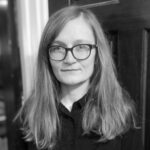 Susanne Stoll completed her undergraduate studies in Psychology at the University of Tübingen, followed by an MSc in Mind and Brain at Humboldt University of Berlin. Currently, she is a final year PhD student under the supervision of Dr Sam Schwarzkopf and Dr John Greenwood in the Department of Experimental Psychology at University College London. Her research uses functional magnetic resonance imaging and population receptive field (pRF) modeling to investigate how perceptual grouping and spatial attention modulate the visual brain’s representation of visual information. Susanne also has a keen interest in relating pRF properties to behavior, multisensory integration as well as counteracting regression fallacies and probing the validity of analysis procedures in visual neuroimaging and beyond.
Susanne Stoll completed her undergraduate studies in Psychology at the University of Tübingen, followed by an MSc in Mind and Brain at Humboldt University of Berlin. Currently, she is a final year PhD student under the supervision of Dr Sam Schwarzkopf and Dr John Greenwood in the Department of Experimental Psychology at University College London. Her research uses functional magnetic resonance imaging and population receptive field (pRF) modeling to investigate how perceptual grouping and spatial attention modulate the visual brain’s representation of visual information. Susanne also has a keen interest in relating pRF properties to behavior, multisensory integration as well as counteracting regression fallacies and probing the validity of analysis procedures in visual neuroimaging and beyond.
Sponsored by Visual Cognition
Crista Kuuramo
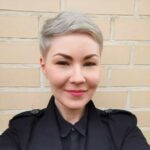 Crista Kuuramo is a PhD candidate under the supervision of Dr. Ilmari Kurki in the Department of Psychology and Logopedics at the University of Helsinki, Finland. She is broadly interested in visual memory and perception from an information processing perspective. Her dissertation aims to study what information is stored in human visual working memory and how that information changes due to forgetting at various levels of visual processing. In her work, Crista uses methods from behavioral experimental psychology, psychophysics, and computational modeling. In particular, she uses classification images, which can directly reveal what visual features are stored working memory representations. She received her B.A. and M.A. in Cognitive science from the University of Helsinki.
Crista Kuuramo is a PhD candidate under the supervision of Dr. Ilmari Kurki in the Department of Psychology and Logopedics at the University of Helsinki, Finland. She is broadly interested in visual memory and perception from an information processing perspective. Her dissertation aims to study what information is stored in human visual working memory and how that information changes due to forgetting at various levels of visual processing. In her work, Crista uses methods from behavioral experimental psychology, psychophysics, and computational modeling. In particular, she uses classification images, which can directly reveal what visual features are stored working memory representations. She received her B.A. and M.A. in Cognitive science from the University of Helsinki.
Samoni Nag
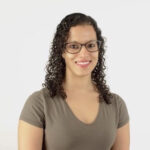 Samoni Nag is a third-year graduate student at the George Washington University in Dr. Steve Mitroff’s Visual Cognition Lab. She is interested in hysteresis effects on attention, visual search, and behavior and hopes to better understand the mechanisms that enhance, limit, and/or alter these processes. Her current projects explore questions related to how visual search competence changes over time and how trial histories and task demands influence subsequent performance. She employs “big data” and individual differences approaches to study these questions. At GW, she also collaborates with Dr. Dwight Kravitz and members of the Army Research Lab. Samoni obtained her bachelor’s in psychology from Emory University and previously worked as a lab manager in Dr. Julie Golomb’s lab at the Ohio State University.
Samoni Nag is a third-year graduate student at the George Washington University in Dr. Steve Mitroff’s Visual Cognition Lab. She is interested in hysteresis effects on attention, visual search, and behavior and hopes to better understand the mechanisms that enhance, limit, and/or alter these processes. Her current projects explore questions related to how visual search competence changes over time and how trial histories and task demands influence subsequent performance. She employs “big data” and individual differences approaches to study these questions. At GW, she also collaborates with Dr. Dwight Kravitz and members of the Army Research Lab. Samoni obtained her bachelor’s in psychology from Emory University and previously worked as a lab manager in Dr. Julie Golomb’s lab at the Ohio State University.
Lynn Schmittwilken
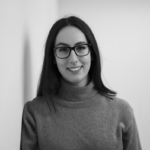 Lynn Schmittwilken is a doctoral researcher in the excellence cluster Science of Intelligence at the Technical University of Berlin, Germany. She is a lab member of the Computational Psychology group of Prof. Dr. Marianne Maertens. She obtained her BSc and MSc in Psychology and Neurosciences at the University of Bremen, Germany. In her graduate work, Lynn investigates how fixational eye movements might be relevant to encode visual information in space and time. For this, she is currently working on biologically-inspired models of early visual processes that investigate to which extent human edge processing and human lightness perception could emerge from an active sampling strategy of the visual system. In her theoretical work, Lynn aims at achieving a better understanding of early vision by integrating insights from active vision into spatial vision models. She plans to combine these theoretical insights with phenomenological findings from her psychophysical experiments.
Lynn Schmittwilken is a doctoral researcher in the excellence cluster Science of Intelligence at the Technical University of Berlin, Germany. She is a lab member of the Computational Psychology group of Prof. Dr. Marianne Maertens. She obtained her BSc and MSc in Psychology and Neurosciences at the University of Bremen, Germany. In her graduate work, Lynn investigates how fixational eye movements might be relevant to encode visual information in space and time. For this, she is currently working on biologically-inspired models of early visual processes that investigate to which extent human edge processing and human lightness perception could emerge from an active sampling strategy of the visual system. In her theoretical work, Lynn aims at achieving a better understanding of early vision by integrating insights from active vision into spatial vision models. She plans to combine these theoretical insights with phenomenological findings from her psychophysical experiments.
2020 FoVea Travel and Networking Award Recipients
FoVea is pleased to announce the winners of our 2020 FoVea Travel and Networking Award.
The FoVea Travel and Networking Award was open to female members of the Vision Science Society (VSS) in pre-doctoral, post-doctoral, and pre-tenure faculty or research scientist positions and intended to cover costs involved in attending the VSS meeting, including membership fees, conference registration fees, and travel expenses. This year due to the unusual circumstances surrounding the COVID-19 pandemic, awardees could chose to apply their award to this year’s Virtual VSS and roll over remaining funds to VSS 2021 if they attend, or defer all funds to VSS 2021.
FoVea created this award as part of its mission to advance the visibility, impact, and success of women in vision science. A recent report from Cooper and Radonjić (2016) indicated that in 2015, the ratio of women to men in VSS was near equal at the pre-doctoral level (1:1.13), but decreased as career stage increased. The decline is symptomatic of forces that impede the professional development of female vision scientists. A key aspect of professional development is building a professional network to support scientific pursuits and to provide mentorship at critical junctions in one’s academic career. The FoVea Travel and Networking Award will help female vision scientists build their professional network by encouraging them to meet with at least one Networking Target at the VSS meeting to discuss their research and consider potential for collaboration.
Five awards are funded by an NSF grant and one is funded by the Visual Cognition journal.
Sponsored by NSF

Lauren Aulet
Lauren Aulet is a fifth-year graduate student at Emory University in Dr. Stella Lourenco’s Spatial Cognition lab. She is interested in how we perceive and represent complex, multidimensional stimuli, and how these representations change (or don’t!) over development. Primarily, her work examines how we perceive and represent numerical magnitude (how can we tell how many objects are present in a scene?), as well as non-numerical magnitudes (e.g., size, brightness, duration, distance, etc.). In this work, she incorporates multiple techniques (psychophysics, eye-tracking, and functional imaging), developmental populations (infancy, childhood, and adulthood) and species (human and canine). At Emory, she also collaborates with the labs of Dr. Daniel Dilks and Dr. Gregory Berns.

Hiu Mei (Doris) Chow
Dr. Hiu Mei (Doris) Chow is a postdoctoral researcher in the Department of Ophthalmology and Visual Sciences at the University of British Columbia, Canada, working with Dr. Miriam Spering. She received her PhD in Developmental and Brain Sciences from the University of Massachusetts, Boston, USA (advisor: Dr. Vivian Ciaramitaro), as well as an MPhil in Cognitive Psychology from the University of Hong Kong, Hong Kong (advisor: Dr. Chia-huei Tseng). Doris is generally interested in understanding how sensory information is captured by multiple sensory systems and integrated in the human brain. At different stages of her training, she investigates the intersection of various sub-disciplines in vision sciences, including visual perception, multisensory perception, development, and eye movements. She is eager to combine these interests and lead a research program contributing to the basic science of multisensory perception and its application in health and disease.
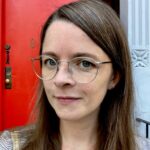
Nina M. Hanning
Nina M. Hanning is a Feodor Lynen Research Fellow in the lab of Prof. Marisa Carrasco at New York University. She received her PhD in 2018 from the Graduate School of Systemic Neurosciences at LMU Munich, where she studied the effects of eye and hand movements on visual perception and working memory under the supervision of Prof. Heiner Deubel. In her current postdoctoral work, Nina is investigating the neurocognitive mechanisms underlying covert and overt visual spatial attention. She is particularly interested in how the programming of saccadic eye movements dynamically shapes our perception across the visual scene. To address her research questions, she combines human psychophysics with eye tracking and transcranial magnetic stimulation (TMS) and develops experimental paradigms to assess spatio-temporal sensitivity dynamics based on reverse correlation.
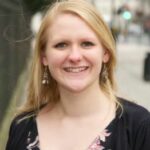
Catherine Manning
Catherine Manning completed her PhD at the Centre for Research in Autism and Education at the UCL Institute of Education, London in 2014 (supervised by Professors Liz Pellicano and Tony Charman), before moving to the University of Oxford to take up the Scott Family Junior Research Fellowship in Autism and Related Disorders. She is now a Sir Henry Wellcome Postdoctoral Fellow at the University of Oxford, conducting research into visual processing in typically developing, autistic and dyslexic children using computational modelling and EEG.
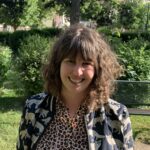
Emma Stewart
Emma Stewart is a post-doctoral researcher at Phillips-Universität Marburg, Germany, working with Prof Alexander Schütz. She completed her PhD at the University of Adelaide, Australia under the supervision of A/Prof Anna Ma-Wyatt. Her research interests revolve around saccade planning and the perceptual consequences of making a saccade. During her PhD she investigated spatiotemporal aspects of attention accompanying saccades and reaches. Her postdoctoral research has focused mainly on transsaccadic perception, and the mechanisms underlying integration of pre- and postsaccadic feature information. She is also working on a second line of research looking at how high- and low-level features of real-world objects might relate to fixations, saccade planning and perceptual confidence.
Sponsored by Visual Cognition

Claudia Damiano
Claudia Damiano is a postdoctoral researcher in the Laboratory of Experimental Psychology of Dr Johan Wagemans at KU Leuven. She earned a PhD in Psychology from the University of Toronto under the supervision of Dr Dirk Bernhardt-Walther, studying the role of visual features in emotion, attention, and memory processes. Claudia’s research interests span a wide range of topics related to visual cognition. Her focus is to understand how low-level and mid-level features (e.g., orientation statistics, symmetry, etc.) form high-level representations of real-world objects and scenes. Her research also explores how these representations influence several aspects of cognition – i.e., visual attention, memory formation, and emotional appraisals. Claudia’s current project is examining the link between complexity, symmetry, and aesthetic pleasure of visual scenes.
Thank you to Karen Schloss, Sarah Shomstein and Steve Most for reviewing the 2020 applications.
2019 FoVea Travel and Networking Award Recipients
FoVea is pleased to announce the winners of our 2019 FoVea Travel and Networking Award.
Sponsored by NSF
Tiffany Carther-Krone
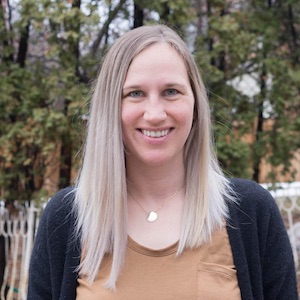
Tiffany Carther-Krone is a PhD candidate in the Department of Psychology at the University of Manitoba under the supervision of Dr. Jonathan Marotta. She is currently interested in studying how humans group features of their environment together to form a global whole by means of behavioral, neuroimaging (fMRI), and psychophysical approaches. To study this she uses visual illusions, which are reliant on Gestalt grouping principals, to determine how illusion susceptibility changes under varying attentional conditions, specifically focusing on grouping under conditions of preattention. She obtained her BSc (honors) in Biopsychology from the University of Winnipeg and her BA in Mathematics from Canadian Mennonite University.
Michele A. Cox
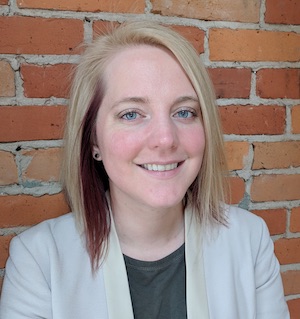
Michele A. Cox is a postdoctoral researcher in the Center for Visual Sciences at University of Rochester. She earned a PhD from Vanderbilt University. Michele’s research interests revolve around how the visual system integrates sensory information with ongoing perceptual, motor, and cognitive processes. Her graduate work focused on the neural underpinnings of sensory integration in early visual cortex, leveraging large-scale, multielectrode intracranial electrophysiological recordings to disentangle feedforward and feedback signals in both cognitive and perceptual tasks. In her postdoctoral work, she is building on her previous experience to study sensory integration during natural viewing. Her research combines computational modeling and human psychophysics with real-time control of retinal stimulation to probe the spatiotemporal dynamics of visual integration in active observers with a particular focus on binocular vision.
Iris Groen
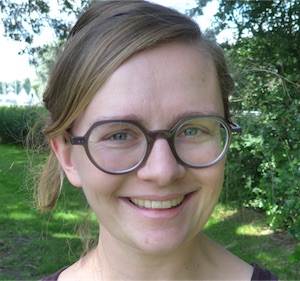
Dr Iris Groen is a post-doctoral researcher with Dr Jonathan Winawer at New York University. She received her PhD from the University of Amsterdam, The Netherlands, where she investigated the influence of scene statistics on rapid scene categorization, working with Dr Steven Scholte and Prof Victor Lamme. Previously, she was a post-doctoral researcher with Dr Chris Baker at the NIMH, where she studied representations within and connections between scene-selective brain regions. Her research focuses on the computational mechanisms underlying natural scene perception in the human brain, which she studies using a variety of methods, including M/EEG, fMRI, TMS, behavior and most recently ECoG. Her current work is part of a BRAIN Initiative project aimed at building models of neural population responses measured with ECoG, MEG and fMRI.
Anna Heue
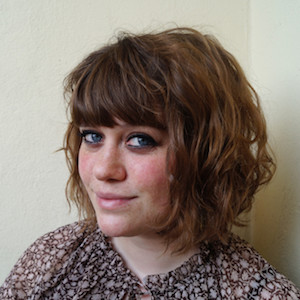
Anna Heuer is a postdoctoral researcher in the Active Perception and Cognition lab of Prof Martin Rolfs at Humboldt-Universität zu Berlin. She completed her PhD in 2016 at Philipps-Universität Marburg under the supervision of Prof Anna Schubö, examining how visual working memory processes are modulated by attention and goal-directed actions. During this time, she was a member of the International Research Training Group ‘The Brain in Action’ and also worked with Prof John Douglas Crawford at York University, Toronto. After a postdoc in Marburg, during which she looked into how motivational value shapes attentional selection, she moved to Berlin in 2018 to start her new project on temporal information in visual working memory.
Lindsay Santacroce
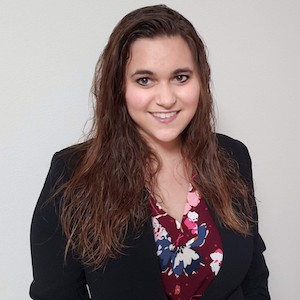
Lindsay Santacroce is a Developmental, Cognitive, and Behavioral Neuroscience Ph.D. student in the Department of Psychology at the University of Houston, where she is advised by Dr. Benjamin Tamber-Rosenau in the Cognitive Neuroscience of Attention Lab. Broadly, she is interested in the limits of human attention and how different tasks compete for limited resources. Lindsay is currently conducting research comparing dual-task costs in cognitive/cognitive and cognitive/motor dual-task paradigms. To accomplish this, she is using theories and methods from cognitive psychology and other fields, and she is developing novel approaches to study dual tasking. In a second line of research Lindsay is elaborating the effects of affective distractors on the attentional blink. Lindsay previously attended the University of Florida, where she graduated summa cum laude with a B.S. in psychology.
Sponsored by Visual Cognition
Jolande Fooken
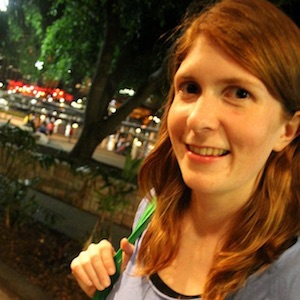
Jolande Fooken is currently a PhD Candidate in the Graduate Program in Neuroscience at the University of British Columbia under the supervision of Miriam Spering. She received a M.Sc. of Biomedical Engineering from RWTH Aachen University and a M.Sc. of Computer Science from the University of British Columbia. Her PhD work focusses on the relationship between eye movements and accurate motion perception and prediction during goal-directed actions. Her work highlights that eye movements can be viewed as a continuous readout of ongoing perceptual processes and can directly be linked to behavioural events and action outcomes. Jolande is also interested in developing more naturalistic task designs to study the interaction between perceptual decision making and eye movement control in real-word scenarios.
Thank you to Karen Schloss, Sarah Shomstein and Steve Most for reviewing the 2019 applications.
2018 FoVea Travel and Networking Award Recipients
FoVea is pleased to announce the winners of our 2018 FoVea Travel and Networking Award.
Sponsored by NSF
Cristina de la Malla
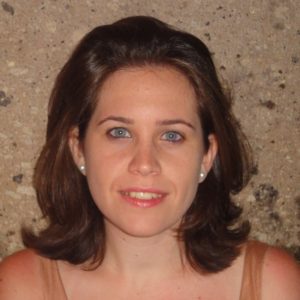
Cristina de la Malla completed her Ph.D. at the Universitat de Barcelona advised by Dr. Joan López-Moliner. During her Ph.D. she investigated the precision of hand movements, and how visual information contributes to achieve such precision. In November 2014, she moved to the Vrije Universiteit Amsterdam for a post-doc under the supervision of Dr. Eli Brenner in the group led by Prof. Jeroen Smeets. During her post-doc, she integrated eye and head movements into her research with the aim of looking into how these movements contribute to perception and action, in tasks that require both spatial and temporal precision such as interception. Currently, Cristina also works for the International Paralympic Committee Research and Development Centre for the Classification of Athletes with Visual Impairments, led by Dr. David Mann. In this project she contributes to develop new criteria for the classification of visually impaired athletes in the Paralympic Games.
Erin Goddard
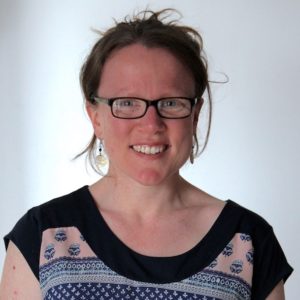
Dr Erin Goddard is a postdoctoral researcher in the laboratories of Profs Kathy Mullen and Robert Hess in the McGill Vision Research Group, at McGill University, Montreal, where she has been since 2017. She received her PhD in psychology in 2010 from the University of Sydney, Australia, working with Prof Colin Clifford and Dr Sam Solomon. She has previously worked as a postdoctoral researcher at Macquarie University (Sydney, Australia) with Dr Alexandra Woolgar and Dr Thomas Carlson. Erin is interested in the cortical processing of colour and mid-level form. She addresses her research questions with complementary approaches from neuroimaging (fMRI, MEG), psychophysics, and computational modelling.
Abigail Lee

Abigail Lee received her BSc (Hons) in Biological Sciences from the University of Leicester in 2015, during which she focused on animal and plant development as well as cellular and molecular neuroscience. During her degree, she was inspired to move into vision research and is now a third-year PhD student at the University of St Andrews supervised by Professor Julie Harris and Dr. Justin Ales. Abigail is particularly interested in the visual perception of motion, depth and motion in depth. She is currently investigating the differences between speed and speed change discrimination for 2D and 3D motion, and what factors may be responsible for these differences.
Kimberly Meier
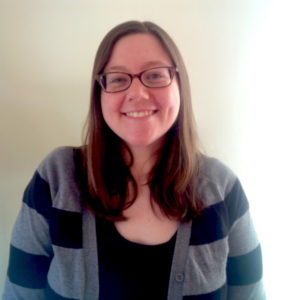
Kimberly Meier is a PhD Candidate in the Department of Psychology at the University of British Columbia under the supervision of Deborah Giaschi. She is interested in how the brain changes in response to visual experience. To study this, she investigates developmental patterns in motion perception and stereopsis (3D perception) in healthy children, and how they can be disrupted during sensitive periods by a childhood vision disorder called amblyopia (“lazy eye”). She is also interested in how these perceptual abilities can change after treatments for amblyopia. She obtained her BA in Psychology and Cognitive Science at Simon Fraser University.
Anna Shafer-Skelton
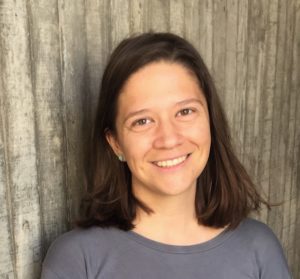
Anna Shafer-Skelton is a second-year graduate student at UC San Diego, working with Drs. Tim Brady and John Serences. As a lab manager in Dr. Julie Golomb’s lab, she became interested in how our visual system constructs a seemingly complete view of the world from many brief fixations, and she is currently interested in the role visual memory may play in this process. Her current projects explore the content and temporal dynamics of memory representations over brief delays, with the goal of understanding how different types of information in natural scenes may be remembered and integrated across eye movements.
Sponsored by Visual Cognition
Emilie Josephs
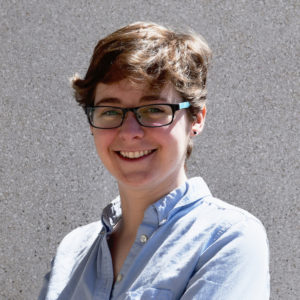
Emilie Josephs is a third-year graduate student in the Psychology Department at Harvard University. She is pursuing her PhD in the Cognitive and Neural Organization Lab under the direction of Talia Konkle. Broadly, Emilie is interested in neural and cognitive mechanisms underlying space perception. She is currently investigating how within-reach environments are represented, and exploring how those representations differ from representations of full-scale scenes and singleton objects. She is exploring this question using neuroimaging, visual feature modeling, and behavioral probes of semantic processing.
Thank you to Karen Schloss, Sarah Shomstein and Steve Most for reviewing the 2018 applications. Thank you also to Zachary Leggon for his help managing the process.
2017 FoVea Travel and Networking Award Recipients
FoVea is pleased to announce the winners of our inaugural FoVea Travel and Networking Award, funded by National Science Foundation.
Kathryn Bonnen
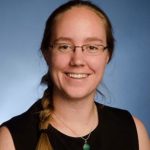
Kathryn (Kate) Bonnen is a PhD candidate in the Institute for Neuroscience at the University of Texas at Austin, where she is co-advised by Dr. Alexander Huk and Dr. Lawrence Cormack. Broadly, Kathryn is interested in 3D vision, multi-sensory perception, and natural scene statistics. Her dissertation work is focused on: 1) the development of continuous psychophysical methods and their ideal observers; 2) 3D motion perception in human and non-human primates. She holds a B.S. in Computer Science and a B.S. in Psychology from Michigan State University.
Jodie Davies-Thompson

Dr. Jodie Davies-Thompson completed her PhD at the University of York with Prof Tim Andrews, where she used fMRI to examine the neural correlates of face recognition. In 2010, Jodie moved to the University of British Columbia (Canada) to work with Prof Jason Barton, investigating neural plasticity of the visual system in patient populations, including rehabilitation of acquired prosopagnosia. In 2014, Jodie moved to the University of Trento (Italy) to work with Dr Olivier Collignon on neural plasticity in blindness and d/Deafness. Jodie is currently undertaking a Marie Curie Research Fellowship at the University of Nottingham (UK) with Prof Doug Hartley, exploring cross-modal plasticity in Deaf individuals. Jodie plans to continue using a range of techniques (behavioural, psychophysical, fMRI, functional connectivity, DTI) to examine normal face processing, rehabilitation of prosopagnosia, and cross-modal plasticity.
Brittney Hartle
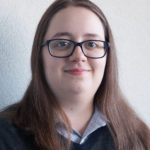
Brittney Hartle received her M.A. (2016) in Psychology from York University, focusing on disparity interpolation of stereoscopic illusory surfaces. She is currently a Ph.D. candidate at the Centre for Vision Research at York University, Toronto. Her research focuses on the depth perception of objects in virtual environments created by various stereoscopic 3D technology. She is currently investigating the factors that influence judgements of shape and volume in simulated virtual environments relative to physical stimuli. The goal of her research is to determine whether common perceptual distortions experienced with virtual stimuli are due to constraints of the hardware (e.g. optics of head-mounted displays) or limitations of our perceptual experience within virtual spaces.
Amanda Robinson
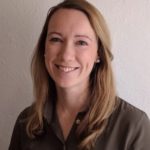
Dr Amanda Robinson is a postdoctoral researcher in the laboratory of Dr Marlene Behrmann in the Department of Psychology at Carnegie Mellon University. She received her PhD in cognitive neuroscience in 2014 from the Queensland Brain Institute at the University of Queensland, Australia, working with Dr Jason Mattingley. Dr Robinson’s research is focused on understanding how different visual and multisensory features are integrated for object perception, particularly in terms of the time course of visual processing. During her PhD, she investigated how odors influence perception of and attention towards matching visual objects. Currently, Dr Robinson is investigating the lateralization of visual processing, specifically focusing on the overlapping mechanisms of face and word perception.
Kara Emery

Kara Emery is currently a second-year graduate student in the Integrative Neuroscience Program at the University of Nevada, Reno. She is pursuing her doctoral degree in the Visual Perception Lab advised by Michael Webster. Kara is interested in the neural mechanisms and coding strategies underlying color and face perception. She is currently investigating individual differences in color appearance and color naming and how these differences inform models of cortical color coding and the relationships between perception and language. She is also extending her analyses using neuroimaging methods to explore color perception in adults and infants, in projects with Dr. Masami Yamaguchi at Chuo University.
Thank you to Karen Schloss, Steve Franconeri and Sarah Shomstein for reviewing the 2017 applications. Thank you also to Madeline Parker for her help managing the process.